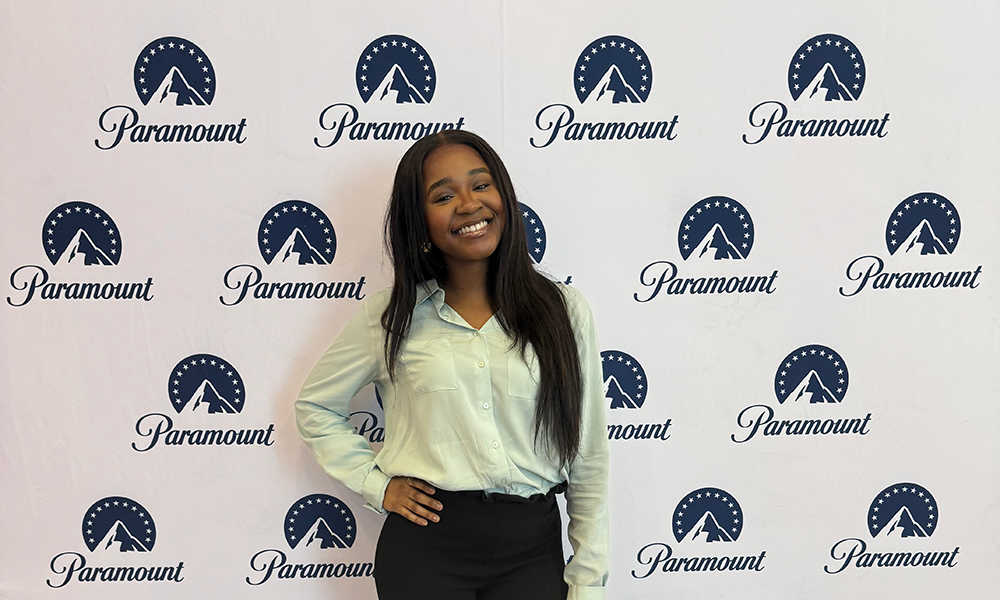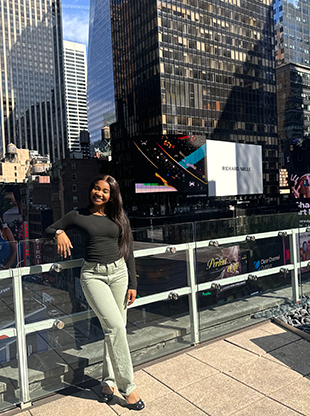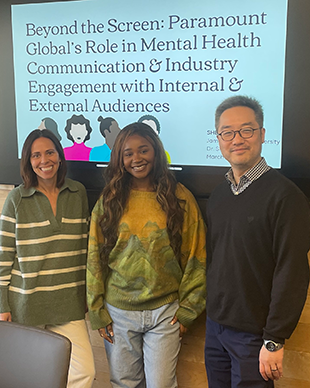Finding her calling: Advocacy beyond the screen
News
SUMMARY: After a dream internship experience in New York City, Sheriden Osei (‘22, ‘25M) is pursuing her next dream while merging her passions for entertainment and advocacy.
Sheriden Osei (‘22, ‘25M) took a winding road to her bachelor's degree in communication studies with a focus on public relations. Her journey, which included changing her major five times, allowed her to explore her passions, grow her skills, discover what really matters to her and find her place in the School of Communication Studies.
“They gave me a chance — to be myself, to pursue what I love and to apply what I’ve learned in meaningful ways,” she reflected. After graduating with her bachelor’s, Osei promptly returned to the department to pursue a master's degree in communication and advocacy and graduated last spring.
Osei’s dream career is entertainment lawyer, aligning her interests in advocacy, storytelling, and media ethics. She is now preparing to pursue a J.D. degree to learn about the evolving landscape and intersections of law, strategic communication and entertainment.
“Throughout my academic career, I have explored the intersection of entertainment and public relations through research, theory analysis, and real-world applications,” Osei said. “I have gained experience across agencies, nonprofits, and the entertainment industry, sharpening my adaptability, attention to detail and ability to thrive in fast-paced environments.”
 One of those real-world applications gave Osei a career-changing experience: the chance to intern at Paramount Global and MTV Entertainment Studios in New York City during the summer of 2024.
One of those real-world applications gave Osei a career-changing experience: the chance to intern at Paramount Global and MTV Entertainment Studios in New York City during the summer of 2024.
Osei had always loved pop culture and entertainment but was unsure how to enter such a competitive field — until she saw the Paramount opportunity on LinkedIn. Finally, she was part of the New York entertainment industry. Her intern experience was in some ways typical, from grabbing coffee for media executives to meeting stars that she had watched on television for years. Every day brought something new — tours of TV studios, designing social media campaigns and assisting with press releases, tours and pitches.
Amid that activity, though, Osei’s background in communication theory made her wonder about the larger implications of that work. Entertainment strongly influences the attitudes and behaviors of real people. How, she wondered, does Paramount leverage its media platforms to lead conversations on mental health, and how do those conversations impact audience perceptions?
Movies and TV do more than entertain us — “the characters portrayed on a screen can change the way real people have conversations about real-world problems,” says Osei. Bringing together communication theory, advocacy for underrepresented experiences and her first-hand knowledge of the entertainment industry, Osei began researching how mass-broadcast media treatments and portrayals of mental health have reshaped the way people think about those topics.
While seeking mental health care has often been stigmatized, Osei has found that evolving representations in movies and on TV have been changing the stigma bit by bit. In the Chicago-set Showtime TV drama “The Chi,” for example, one character launches a healing circle for Black men in the community to engage in open discussion and share guidance.

To Osei, the show’s groundbreaking storyline helps counter the stigmas that often deter marginalized groups from seeking mental health care by presenting a variety of practices to exercise cognitive well-being.
Osei can even imagine how her own research might, in turn, shape the very media representations that are themselves so influential. Directors and script writers are experts in writing entertaining and engaging content, but not in mental health. They rely on researchers like Osei for help depicting sensitive and underrepresented topics.
Now, Osei hopes that people with limited access to mental health resources might learn how to have real-world conversations about mental health by seeing those conversations modeled on screen.
Pursuing her J.D. will allow Osei to merge her passion for entertainment with communication and especially advocacy, including for marginalized communities.
“I want to serve people who look like me, helping them navigate spaces where they might not have historically had representation or guidance,” she said. That’s why she will support JMU in any way she can, even after she leaves campus. “I want to be the advocate I wish I had when I was first navigating my academic and professional journey.”
